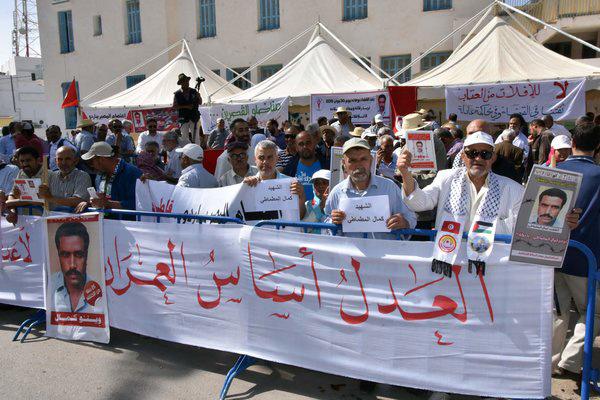You are here
First rights trial since 2011 revolt opens in Tunisia
By AFP - May 29,2018 - Last updated at May 29,2018
GABES, Tunisia — The first court case brought by a Tunisian commission probing human rights violations stretching back six decades opened on Tuesday, with 14 former officials, including the ousted dictator, on trial.
The Truth and Dignity Commission (IVD) was set up in 2014 following the 2011 revolt that toppled dictator Zine El Abidine Ben Ali and sparked the Arab Spring uprisings.
It has a mandate to investigate human rights violations between 1957, when Habib Bourguiba became president, and the date of its creation, with the aim of holding perpetrators to account and rehabilitating their victims.
Tuesday’s first court case concerns the forced disappearance of Kamel Matmati, a member of the Islamist movement Ennahdha, who was arrested in October 1991 during Ben Ali’s rule, and tortured to death.
The courtroom in the southern coastal town of Gabes, where Matmati was taken, was packed with family members and activists who called for justice, an end to impunity and closure.
“We want those who killed him, tortured him, to be tried” and convicted, Matmati’s widow Latifa told AFP.
“We have spent terrible years. The hardest of all is” that his body has not been returned to the family, she said.
“But today we are happy because the truth will be finally unveiled,” she added.
On trial are Ben Ali, who lives in exile in Saudi Arabia, his interior minister Abdallah Kallel and 12 other former officials, including former security chief Mohamed Ali Ganzoui — but all are being tried in their absence.
They face charges of voluntary homicide, torture and forced disappearance.
‘Systematic crimes’
“It is an exceptional day,” defence lawyer Habib Kheder said.
“It is rare for results to emerge from a case of forced disappearance... we know part of the truth but the rest must come to light,” he added.
Since the IVD began work, it has received more than 62,000 allegations of human rights violations, including rape, murder and torture, committed between 1955 and 2013.
The commission has interviewed close to 50,000 people and referred at least 32 cases of “serious violations” of human rights to Tunisian courts.
Human Rights Watch said Tuesday’s trial could be a turning point for Tunisia’s judicial system and to consolidate democracy in the birthplace of the Arab Spring.
Related Articles
TUNIS — The commission tasked with healing the wounds of dictatorship in Tunisia has dug up accusations both against incumbent President Bej
TUNIS — A commission seeking justice for families of people who suffered torture and other rights abuses during decades of authoritarian rul
TUNIS — A Tunisian tribunal charged with healing the wounds of six decades of dictatorship in the North African country accused the state on

















